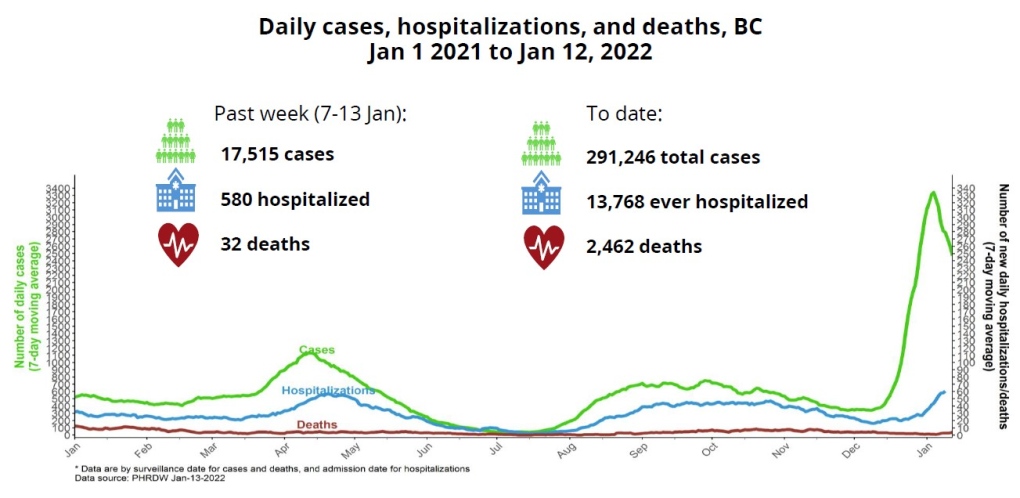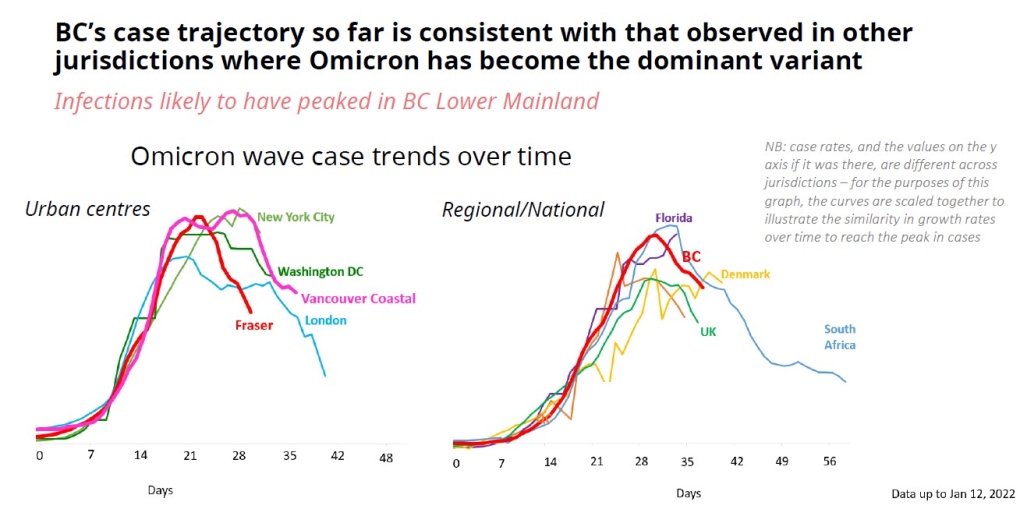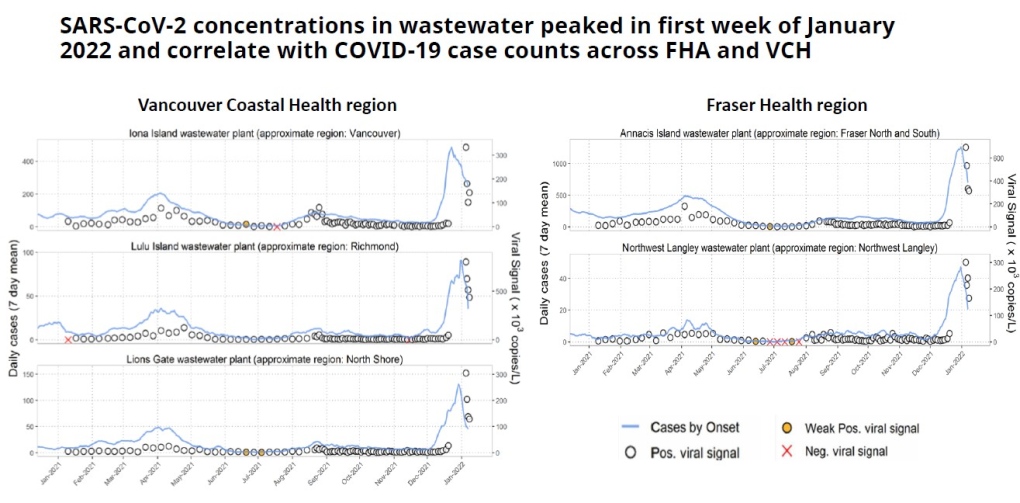B.C. likely hit COVID-19 transmission peak last weekend, officials say, revealing latest data
The latest COVID-19 wave may be on a downward trajectory in B.C., health officials announced Friday.
Dr. Bonnie Henry and Health Minister Adrian Dix shared the latest modelling data in a morning news conference, revealing they believe the local peak of infections was likely hit last weekend. Daily cases reached record-breaking levels recently, largely due to how transmissible the Omicron variant is.
COVID-19 case data in the latest wave hasn't painted a full picture of how many people are infected with the disease as B.C. has struggled with its testing capacity. The more reliable PCR tests are being reserved for people who are more at risk for developing serious illness, unvaccinated or doing front-line work. Rapid tests, however, are still difficult for most people to access.
As a result, officials said Friday that PCR testing – and therefore reported case counts – just represents a subset of the community, but that it's a high-risk subset with high test-positivity rates. Officials said those positive PCR results are declining, adding that the specific case numbers aren't as important as the overall trajectory.
Officials suggested that transmission is still likely three to four times the numbers reported daily.
"We've been at the capacity of our PCR tests for a number of weeks now," Henry said.
"But it does give us a sense because we've been monitoring PCR testing over time, it does reflect the change and the patterns over time." Modelling data released by B.C. health officials on Jan. 14, 2022.
Modelling data released by B.C. health officials on Jan. 14, 2022.
Additional data shared by health officials showed the Lower Mainland's case trajectory is similar to other urban centres where Omicron has become dominant, with the latest wave lasting just a few weeks before starting that downward trend.
"We can now say with some confidence that the pattern shows a sustained decrease and that pattern reflects what we're seeing in other jurisdictions," Henry said.
That B.C. may have reached its peak in this wave so quickly isn't a huge surprise, officials said, explaining the Omicron variant has shown to have both a shorter incubation period and a shorter illness duration.
 Modelling data released by B.C. health officials on Jan. 14, 2022. Another way health officials have tracked the trend in local cases is through wastewater testing. Screening of wastewater at five Metro Vancouver plants shows detection of the virus is trending downward.
Modelling data released by B.C. health officials on Jan. 14, 2022. Another way health officials have tracked the trend in local cases is through wastewater testing. Screening of wastewater at five Metro Vancouver plants shows detection of the virus is trending downward.
Throughout the pandemic, wastewater has been used as an early warning signal for COVID-19 in a community and fill the gaps when testing is over capacity.
"When we look at wastewater surveillance, it's not dependent on who gets tested," Henry explained. "It really is a barometer of how much virus is in a community."
Henry said that surveillance suggests a peak in the virus at around the first week of January, which she said "is very similar" to PCR testing data.
 Modelling data released by B.C. health officials on Jan. 14, 2022. But even with cases declining, the same can't be said for hospitalizations.
Modelling data released by B.C. health officials on Jan. 14, 2022. But even with cases declining, the same can't be said for hospitalizations.
"We are still at the point where our hospitalization rate is going up," Henry said. "New hospitalizations (are) still a concern."
Officials explained those rates tend to be delayed compared to infections and that it could be about a week or two before there's a decrease in those numbers.
CTVNews.ca Top Stories

NEW After hearing thousands of last words, this hospital chaplain has advice for the living
Hospital chaplain J.S. Park opens up about death, grief and hearing thousands of last words, and shares his advice for the living.
Police cordon off Iran consulate in Paris where man threatens to blow himself up: French media
French police cordoned off the Iranian consulate in Paris on Friday, where a man was threatening to blow himself up, Europe 1 radio and BFM TV.
Some Canadian families will receive up to $620 per child today
More money will land in the pockets of some Canadian families on Friday for the latest Canada Child Benefit installment.
BREAKING Iran fires at apparent Israeli attack drones near Isfahan air base and nuclear site
An apparent Israeli drone attack on Iran saw troops fire air defences at a major air base and a nuclear site early Friday morning near the central city of Isfahan, an assault coming in retaliation for Tehran's unprecedented drone-and-missile assault on the country.
American millionaire Jonathan Lehrer denied bail after being charged with killing Canadian couple
American millionaire Jonathan Lehrer, one of two men charged in the killings of a Canadian couple in Dominica, has been denied bail.
Ottawa to force banks to call carbon rebate a carbon rebate in direct deposits
Canadian banks that refuse to identify the carbon rebate by name when doing direct deposits are forcing the government to change the law to make them do it, says Environment Minister Steven Guilbeault.
Ontario woman loses $15,000 to fake Walmart job scam
A woman who recently moved to Canada from India was searching for a job when she got caught in an online job scam and lost $15,000.
After COVID, WHO defines disease spread 'through air'
The World Health Organization and around 500 experts have agreed for the first time on what it means for a disease to spread through the air, in a bid to avoid the confusion early in the COVID-19 pandemic that some scientists have said cost lives.
Prince Harry formally confirms he is now a U.S. resident
Prince Harry, the son of King Charles III and fifth in line to the British throne, has formally confirmed he is now a U.S. resident.






























